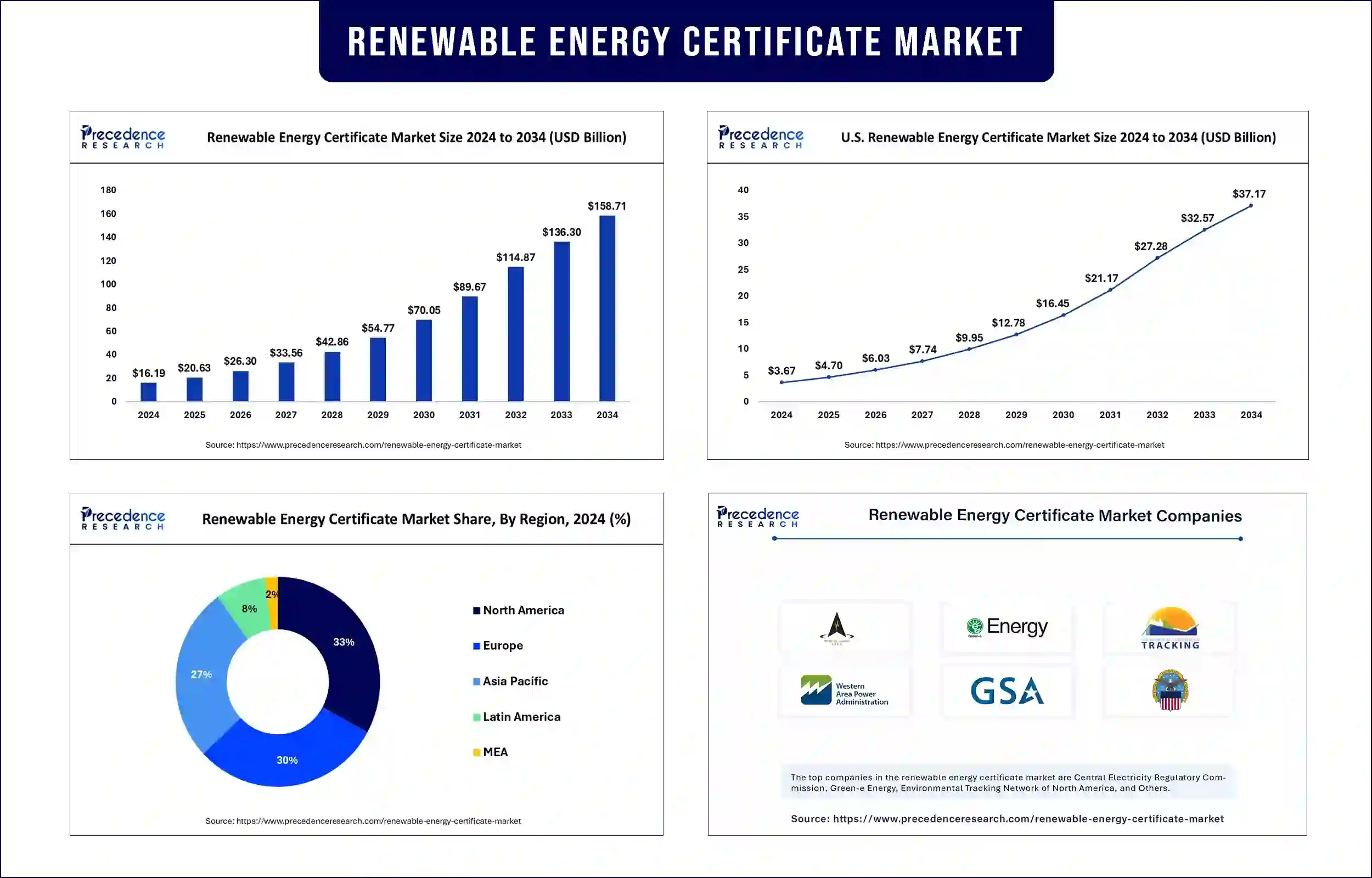December 2024
The global renewable energy certificate market was USD 16.19 billion in 2024, accounted for USD 20.63 billion in 2025, and is expected to reach around USD 136.30 billion by 2033, expanding at a CAGR of 25.64% from 2025 to 2034. The demand for power across the globe is increasing, which is the key factor driving the growth of the market.

Renewable energy certificates, also called green tags or tradable renewable certificates, are non-tangible energy facilities that give proof that 1MWh of electricity was created from a proper renewable energy source. Governments across the globe are deploying renewable portfolio standards (RPS) to raise the share of renewable energy, generating demand for RECs. Many businesses are setting new targets to decrease their carbon footprint using RECs to show their commitment to renewable energy.
By energy type, the solar energy segment led the renewable energy certificate market in 2024. The dominance of the segment can be attributed to the increasing government investment and initiatives in solar power plants across the globe. The wind power segment is expected to grow at the fastest rate over the forecast period. The growth of the segment can be credited to the surge in demand for wind power-based efficient energy solutions globally.
By capacity, the 5000 KWH segment held the largest market share in 2024. The dominance of the segment can be driven by the increasing number of solar and wind farms globally. The more than 5000 KWH segment is anticipated to grow at the fastest rate during the forecast period. The growth of the segment is due to the ongoing development and presence of more power in the power generation plants.
By end use, in 2024, the compliance segment dominated the market by holding the largest market share. The dominance of the segment is owing to the raised government initiatives to optimize the adoption of green energy regulations. The voluntary segment is estimated to grow at the fastest rate during the projected period. The growth of the segment is because of the growing demand for energy along with the stringent government policies.
Technological innovations such as the development of more sophisticated wind turbines and solar panels are making renewable energy more cost-effective, impacting the renewable energy certificate market growth positively further. Additionally, the utilization of blockchain technology for REC verification and trading is gaining traction, improving efficiency and transparency.
Surge of Green Corporate Procurement Initiatives
A substantial trend in the market is the increasing emphasis on green corporate procurement initiatives. Many organizations, particularly in the food and beverage industry, are increasingly seeking more secure renewable energy options through RECs as a segment of their broader sustainability efforts. Moreover, this trend is driven by the growing pressure from investors, consumers, and regulatory bodies for organizations to decrease their carbon footprints.
Government Policies and Support
One of the major factors driving the growth of the renewable energy certificate market is strong support from government policies and initiatives. Governments across the globe are increasingly deploying stringent regulations and offering incentives to boost the use of renewable energy. In addition, developing countries like India are adding RECs to their national renewable energy initiative. This factor plays an important role in propelling the demand for RECs.
North America held the largest renewable energy certificate market share in 2024. The dominance of the region can be attributed to the ongoing government initiatives to optimize the expansion of renewable energy certificates. Furthermore, the region's growth is mainly fueled by strict renewable energy standards implemented by governments in these countries. The region is distinguished by the presence of many technologically developed companies that require huge amounts of energy, fostering market growth soon.
Europe is expected to grow at the fastest rate in the renewable energy certificate market over the studied period. The growth of the region can be credited to the increasing need for green energy across several industries. Moreover, growing awareness regarding the harsh environmental conditions has impelled the European government to invest heavily in the development of these certificates. Major market players in the region include Fortum Corp, Orsted, Vestas, TotalEnergies, EDF, Engie and Iberdrola.
| Report Attribute | Key Statistics |
| Market Revenue in 2024 | USD 16.19 Billion |
| Market Revenue by 2033 | USD 136.30 Billion |
| CAGR | 25.64% from 2024 to 2033 |
| Quantitative Units | Revenue in USD million/billion, Volume in units |
| Largest Market | North America |
| Base Year | 2023 |
| Regions Covered | North America, Europe, Asia-Pacific, Latin America, and Middle East & Africa |
By Energy Type
By End Use
By Capacity
December 2024
January 2025
April 2024
January 2025